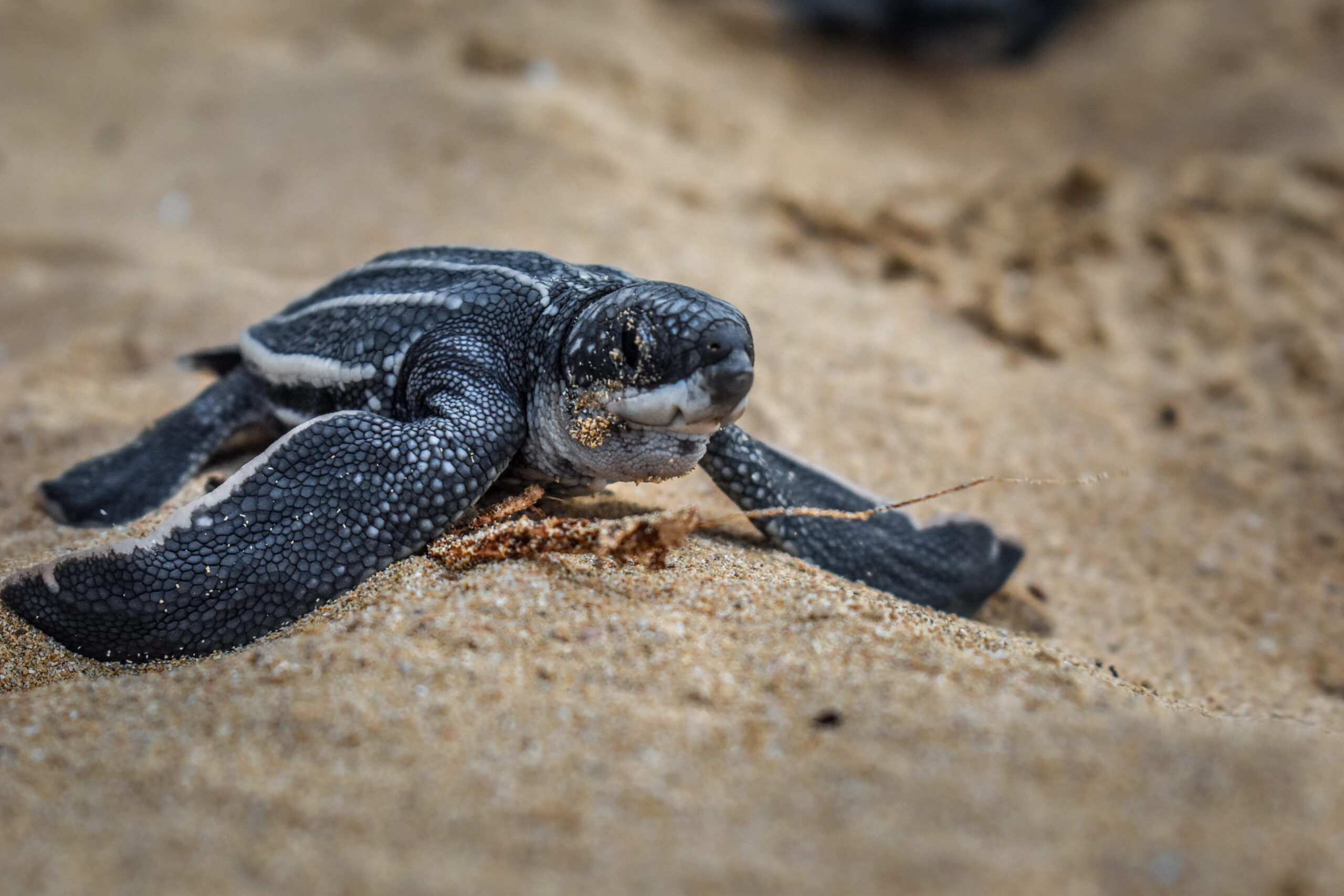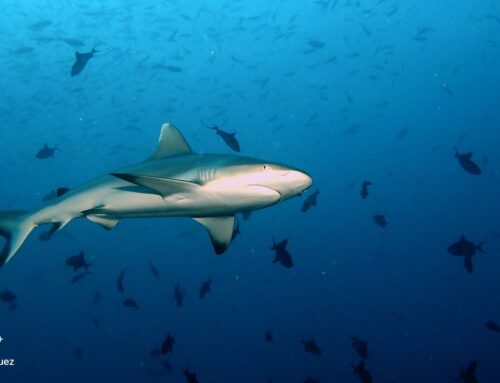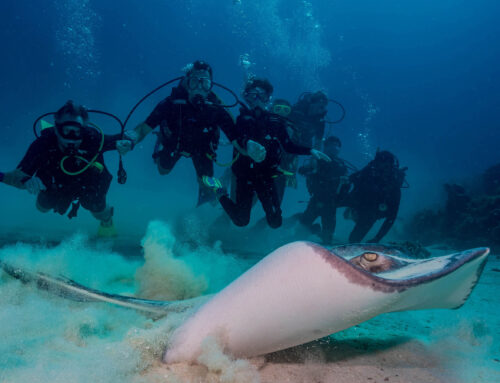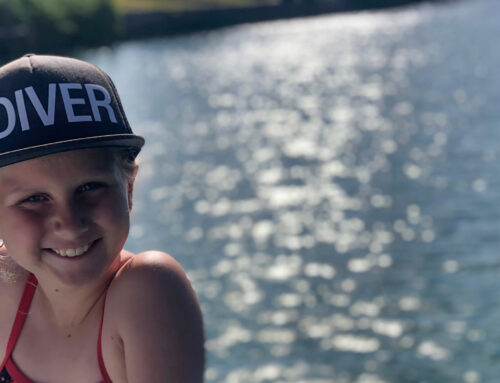The echo of the rooster’s cry combines with the gentle breeze and cricket’s song to usher in a new dawn on the peaceful village of Mano Juan, on the coast of Saona Island in the Dominican Republic.
A gentle mist covers the quiet streets as I make my way along the dirt path that leads to the little green clapboard house that Pelagio Paulino, better known as Negro, the keeper of the turtle sanctuary, calls home.
A huge smile greets me as he bustles around his motorcycle which he is preparing for our journey.
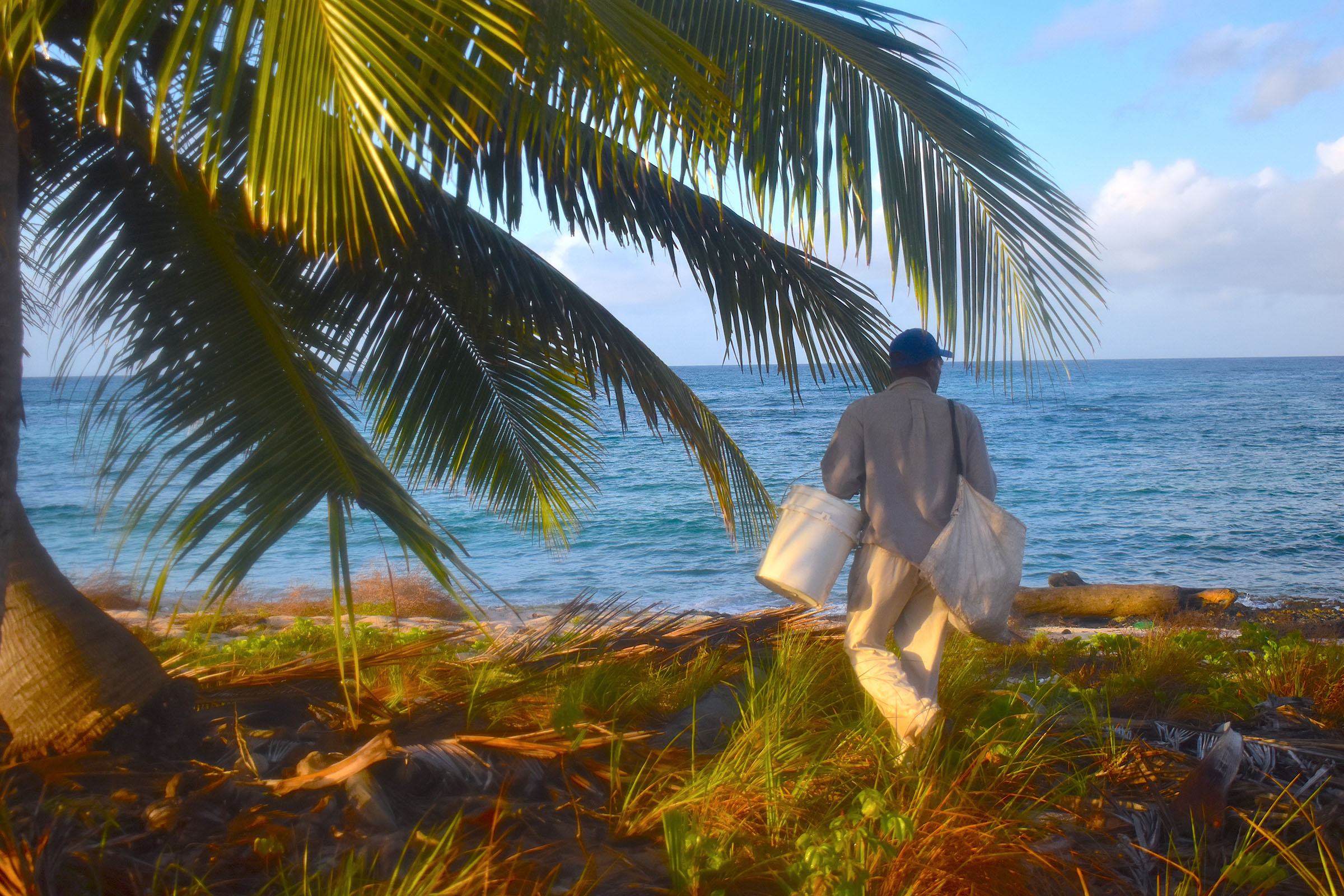
Today I will be joining him on an expedition to survey his territory and make sure that nothing is going wrong with any of his precious turtle nests.
He meticulously arranges his machete, buckets, gloves and an array of other tools on his homemade “saddle” for the motorcycle. I offer to help although I am not sure how I could as he seems to have his routine downpath.
As I look at all the set-up, I wonder where exactly it is that I will be sitting. That quickly becomes clear as he jumps on and shows me the stands for my feet and jovially says to climb aboard and not mind the clutter. Easier said than done…I confess to not being very familiar with motorcycles so this was a feat on it’s own. A few laughs later, clumsiness and all I manage to get seated without making us fall over.
Once seated behind him, I clutch my camera as he sets off.
We quickly exit the tiny village streets and make our way down a windy path through the jungle. Thousands of land crabs scurry out of our way and it feels very surreal. The mist hugs the trees close and seems to reach out to touch us with long fingers. Combined with the rustle of the crabs and birds hiding in the forest, it makes for a fairytale-like ambiance.
I click away but no matter how many photos I take, I cannot capture the surrealness of the morning.
Unfazed by city folk amazement, Negro drives on until he abruptly stops in the middle of nowhere. How he knows where to stop, I will never know. He quickly orders me off and grabs the bucket, machete and the rest of his gear and says “Follow me!”. With no more explanation than that, he makes his way down a barely visible path that winds past huge trees and scratchy branches that eventually give way to long grass and outcropping of rocks. Waves crashing announce that we are arriving at our first stop.
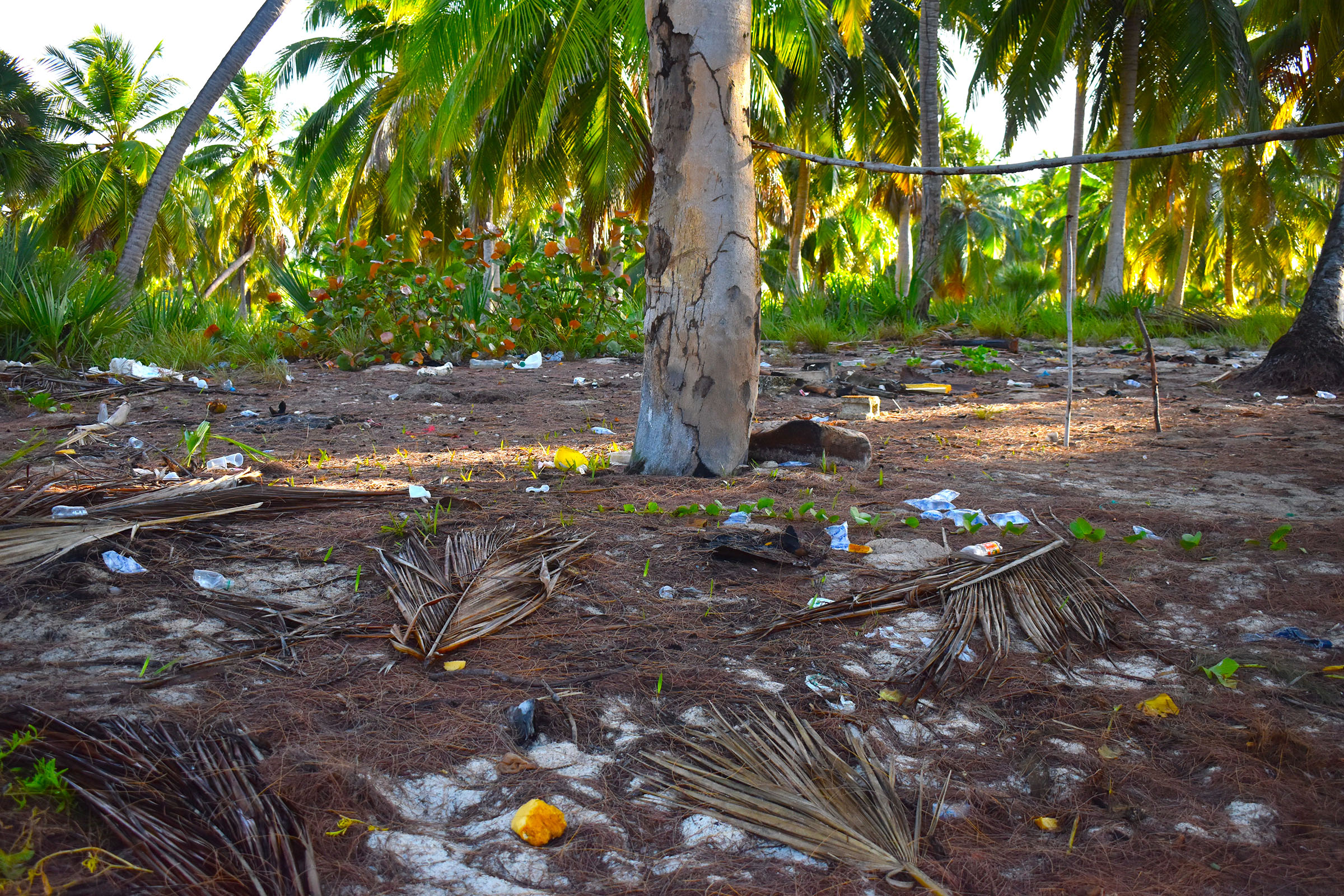
Carefully, he makes his way to the only sand patch along the rocky shore where he proceeds to tell me that this is the first nesting site. He looks around to make sure nothing has been disturbed and satisfied that all is well he abruptly turns and we return to the waiting motorbike.
This time, I know a little more about what to do now and easily climb alongside the equipment. We continue making stops like this until we reach a clearing where huge palms are bathed by the early morning light. This is where the ride stops and the walking begins declares Negro and we quickly gather our things.
Along the path, the tall grass gives way to beautiful beach flowers and vines that crawl the sand dunes. We will walk along the shore for the next 10 miles or so of coastline, happily declares my guide.
As I follow him along the coast, I am amazed how in tune this man is with nature. He promptly takes his shoes off and dumps them in the bucket he is carrying saying he feels nature’s pulse through the ground this way.
Every once in a while he will venture a little more inland and show me the nesting sites. How he remembers each one and exactly where to find them is a mystery to me. He explains that he has tactics to camouflage them and uses some natural signs like coconuts, or shells or number of trees and many more things to distinguish each nesting site.
As I walk behind him, I have the feeling that I am following a ghost. The mist swirls around his feet as it begins to lift the sun and starts it’s morning ascent into a clear blue sky. Birds call out, the surf rushes back and forth in it’s eternal dance and we walk on.
Suddenly he rushes forward, clearly upset. Camera in hand I follow, not sure what has caused the abrupt change and commotion.
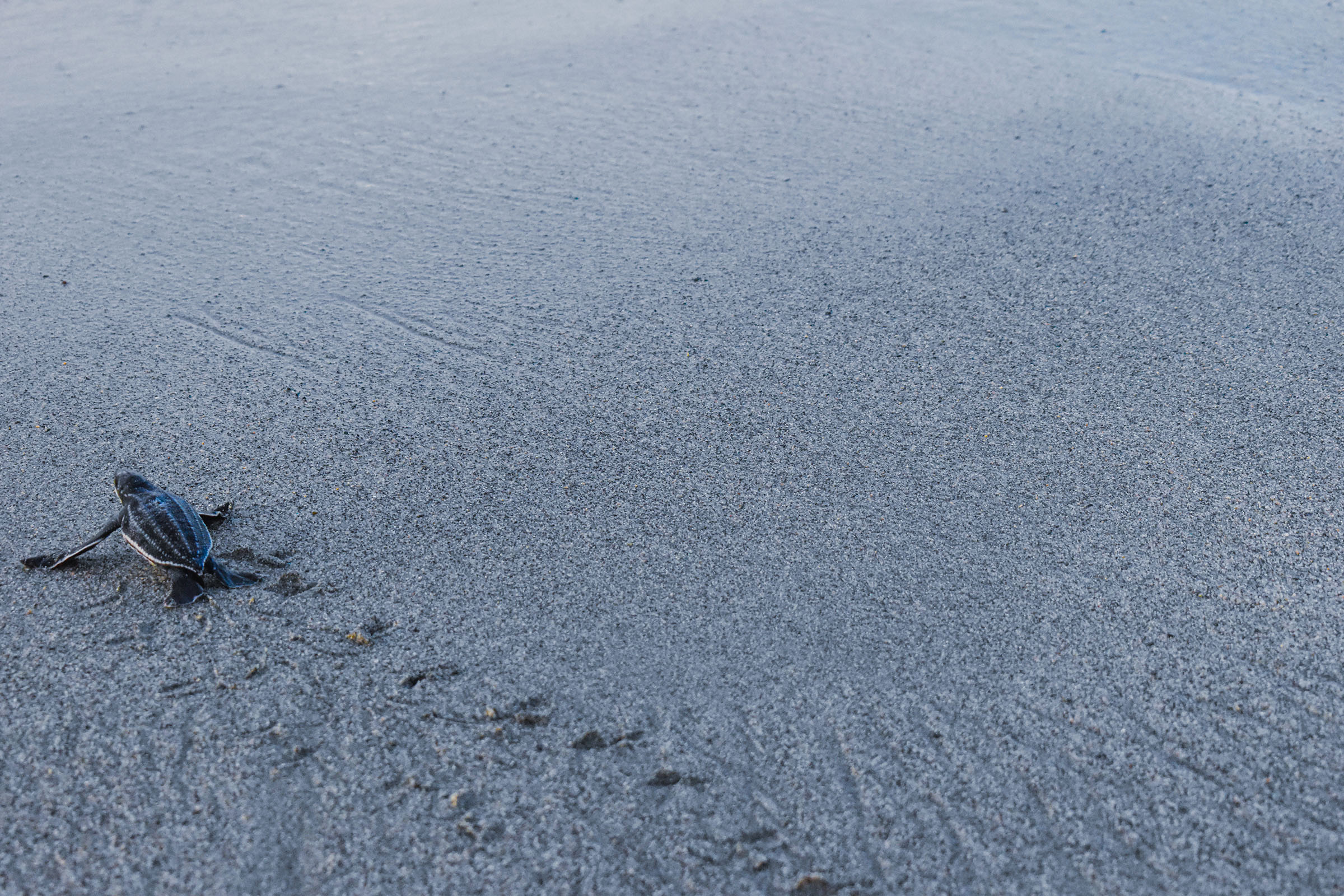
“Look there!” He says as he points to the offending hole in the sand. “Can’t you see?” he says, shaking his head. But I am still bewildered.
Patiently, he explains to me that we are looking at a crab hole and that the offender (the crab who chose this place to call home) has dug right over a turtle nest. This has to be corrected, he explains, or else that crab will eventually dig deep enough to reach the eggs where he will proceed to feed until there are no more eggs…
So I watch in awe as he digs to the eggs to check on them and then covers them back up. The offending crab is found and gently relocated further down the beach.
There, covered in sand and happy once again my guide seems quite pleased with the morning’s work so far. One sip from the water jug he carries and we continue onwards.
Blue herons, white herons, pelicans and sandpipers all go along with their morning routine as we quietly walk on. There is so much to see, I am not sure where to point the camera. Can’t straggle behind though as he quickly pulls ahead.
Then anger fills his normally serene face as he points ahead. We have come upon an abandoned fishing camp.
Quickly, I can see the reason his features changed so sharply. Garbage litters the ground in all directions. Old broken fishing nets, empty water jugs, ice bags, beer and wine bottles, and all sorts of random items have been carelessly strewn about.
We attempt to recover as much of the garbage as we can in the bucks but it is too much to carry and we are very far now. Negro explains that he will return with some of the volunteers (teens that he pays from his own savings) and a few of his horses to pick everything up later that day. He is very upset by this scene and sighs as he explains that this is a constant battle. Every week random fishermen enter the zone, and although it is a National Park, they camp out and fish leaving behind not only fish guts and the like but an entire disaster made from human carelessness. Were it not for his efforts, this waste would join the millions of plastic pieces that float in our oceans.
I am amazed that men who live from the bounty of the sea are no more concerned than that with making sure the sea survives. The level of lack of education is astounding to me. I share Negro’s outrage as we attempt to clean what we can.
Shortly afterwards as we continue our walk it is becoming increasingly clear that there is more and more sargasso along the beach and it is becoming more and more difficult to walk. Eventually we must turn to the jungle and retrace our steps. I am happy to see that we will be taking a path in the jungle back as walking in the sand dunes is much harder than it looks.
The sun is steadily climbing in the sky and the day is much warmer than when we started off since the morning mist has burned out long ago.
Joy fills Negro face as he exclaims “The restaurant is open!”
Confused, I look around and all I see are more palm trees, a few birds curiously looking down at us and grass.
Seeing my confusion, Negro laughs as he points to the low branches of a palm tree where he proceeds to grab a coconut, and expertly wielding his machete makes short work of preparing it. This along with a handful of strange fruit he plucks from a bush, he exclaims, is the best breakfast on the island.
Breakfast over, we continue walking until the motorcycle appears in the clearing ahead, just where we had left it.
Thankful for the rest, legs tingling from the long walk, I climb aboard and we head back to the village. The morning vigil is over. I am shocked to see that it is almost 11 am already. Considering we had set out at 6 am, I have no idea where the hours went. I am amazed that his dedicated soul makes this journey almost every day.
There is no way to explain the enthusiasm when Negro describes the nests he is caring for or how many turtles he has been a part of releasing in the wild. Nor the level of caring that fills the tones of his voice when he speaks about the urgency for things to change and the anger he feels towards all the ignorant people who poach the eggs, litter the coast and generally disrespect nature in such blatant ways.
One thing is obvious though, this is his calling.
